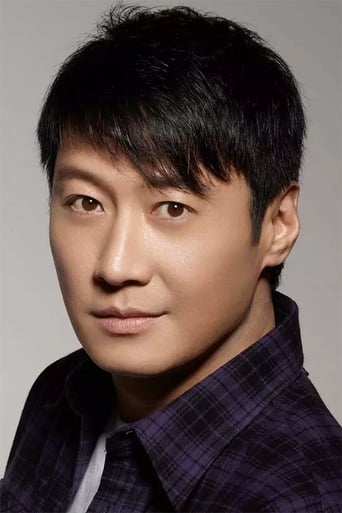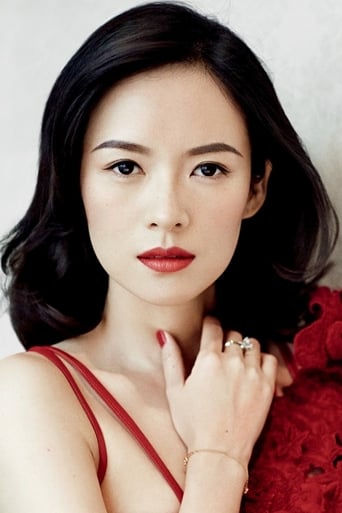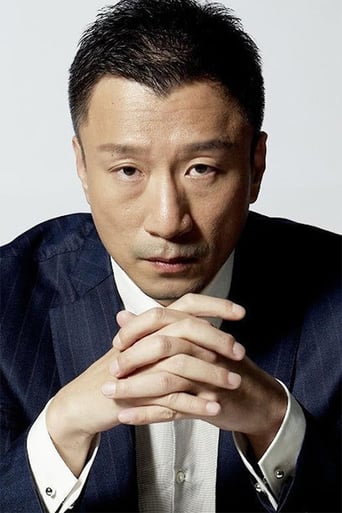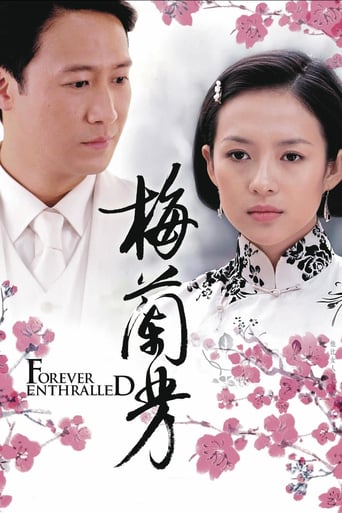
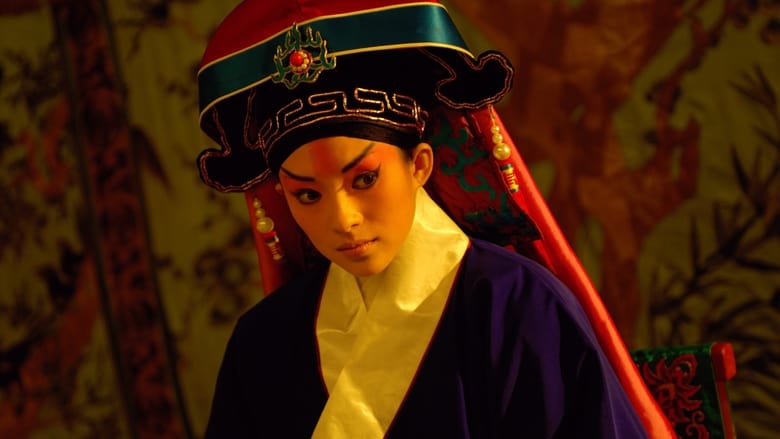
Forever Enthralled (2008)
The epic story Mei Lanfang, who overcame the prejudice against artists in 1930s China to become the country's greatest opera star.
Watch Trailer
Cast


Reviews
The plot isn't so bad, but the pace of storytelling is too slow which makes people bored. Certain moments are so obvious and unnecessary for the main plot. I would've fast-forwarded those moments if it was an online streaming. The ending looks like implying a sequel, not sure if this movie will get one
This is one of the best movies I’ve seen in a very long time. You have to go and see this on the big screen.
what a terribly boring film. I'm sorry but this is absolutely not deserving of best picture and will be forgotten quickly. Entertaining and engaging cinema? No. Nothing performances with flat faces and mistaking silence for subtlety.
This is one of the best movies I’ve seen in a very long time. You have to go and see this on the big screen.
If you don't know anything about China and mei lanfang, I am sure that this movie is a little too hard to understand. After all, not every Chinese likes the Beijing opera. Just like many westerns are fascinated by the European royal families, many Asians don't really care about them at all. So it is the cultural thing.Over all, this is a good movie, but it is a little too long. Of course, it is hard to tell a life story of a person for such a short time.Shi Sanyan is really amazing. I felt as if he was indeed born in that time. It is also probably because I have never seen him on the screen before, so his performance was very fresh and authentic. Most of the supporting roles are very well performed. My mother thinks that the younger version of mei lanfang was better than the older version. The older version looks too stiff. I sort of agree with her.I am writing this comment because there are only nine comments before me. After all, this is a good movie, it deserves for more comments.
I got to watch this trailer inadvertently when it was part of a montage sequence honouring Chen Kaige with the Akira Kurosawa Award during last year's Tokyo International Film Festival, and I was actually thrilled to have caught glimpses of it. I thought the boo-boys were out too early in lamenting Chen's choice of Leon Lai in the titular role, thinking that he would ruin what would be a decent biopic about one of China's greatest opera singer.To me, those fears were quite unfounded, as I felt Leon Lai actually did reasonably well when under the thick operatic makeup to transform himself for his stage persona, from Mei Wanhua to Mei Lanfang, where portrays only female characters. But of course if put side by side with Chinese actor Yu Shaoqun, Lai paled considerably as Yu was obviously the better of the two, portraying the younger Mei who found his true calling when opportunity came knocking on his door, and deciding to seize it, yet being mindful all the time of where his roots were.And the best parts were of course the first act, where Mei decides to up the ante and challenge his master, the then largest opera star Shi Sanyan (Wang Xueqi) to a show-down of sorts if you will. Under his master's wing, he finds himself somewhat stifled in not being able to explore his roles much further, given the master's fear that his thunder will be stolen. At the encouragement of maverick magistrate and future sworn brother / business manager Qiu Rubai (Sun Honglei), he finds some new found confidence to test waters while still keeping true to the core of his character, thus earning new praise, and given one's talent with nothing much to lose, one will go for broke - win and you win all, lose and you have really no reputation at stake, in contrary to his master.It's about control, or the lack thereof. From early on we learn that actors in the days of the crumbling of the Chinese monarchy that they do not have any respect, and have to play to the whims of those with power, money and fame. Even then the child actors have to pander to lords with a penchant for young boys. Mei does not buckle his self-worth, and is pretty clear that while he portrays ladies in more feminine terms than real ladies, that it does not make him easy fodder. And we follow through his life how he does not get to live the life he wants to lead, but rather according to both the rules and regulations of the stage, as well as the same off it in society. Be it instructions from his managers, his wife Zhifang (Chen Hong) or the Japanese occupiers, each seemingly want to exert an influence over his career and personal life, not so much for personal gain, but to propagate that legend and persona so carefully crafted over the years.Naturally Mei finds an avenue to fight back, and does so through an affair of the heart. While he portrays females on stage, he meets his equal in Meng Xiaodong (Zhang Ziyi), who is his mirror opposite, the best in the business in playing male characters. Together they blaze a trail of glory, and naturally leads to tongues wagging. While Zhang Ziyi may share top billing, in actual fact she's nothing more than a supporting role, coming in only in the middle portion to highlight Mei's need for escape from his rigid world.Much is said about the supporting actors doing a far better job than the leads, and that is true, in a nice way. My respect for the Chinese actors have grown from watching a number of indie and mainstream films, and I can't credit the likes of Sun Honglei, Chen Hong, Wang Xueqi and especially Yu Shaoqun in being nothing less than superb each time they come on screen to chew up the scenery. It's not really fair to say the leads acted poorly, because the supporting cast had raised the bar in delivery, which adds to the enjoyment of the film.I can never forget the really poor movie in The Promise which Chen Kaige made a couple of years back. The story was so bad it allowed the special effects to run wild in trying to salvage the show. There aren't a lot of Chinese bio-pics (or at least those I have watched) in recent years that were non-martial arts related (think Ip Man, Wong Fei-Hung, Fong Sai-Yuk, Huo Yuanjia etc), and somehow I'm glad Chen Kaige found his mojo back to helm this, and in far elegant terms that I'm now better convinced to check out more of his filmography. He was able to shift gears quite effortlessly between distinct acts of the narrative, which straddled a timeline from after the Qing Dynasty to after the surrender of the Japanese. However, there might seem to be a quantum leap in addressing issues towards the last 30 minutes, but for everything else, it was paced quite evenly to keep you interest from waning.Forever Enthralled has all the ingredients of a credible epic, from beautiful set designs and art direction, to a wonderful soundtrack and elegant costumes, Chen Kaige does not scrimp in making this film look and feel just like it would back in those days of sheer opulence. While opera may be an artform that is dwindling here, don't let the Peking Opera focus here put you off, as you just might find some reason to want to watch the real thing if you have the opportunity to. Definitely recommended.
After going somewhat astray with "Wu ji" (2005), director Chen, his loyal followers are happy to see, is back in form with this biopic of China's legendary Beijing Opera icon MEI Lanfang. While general consensus has it that this film does not quite reach the height of "Farewell my concubine" (1993), it is a step in the right direction, especially when you shudder at the realization of how low his one-time camera man ZHANG Yimou can sink, with the likes of "House of flying daggers" (2004) and "Curse of the golden flower" (2006). People just have to realise that not everybody can be Ang Lee. But I digressed.Structurally, two-and-a-half-hours "Forever enthralled" can be seen as a film in two parts. Part One, comprising the first 60 minutes, is "young Mei", without the stars Leon Lai and Ziyi Zhang. The ensuing 90 minutes is "middle-age Mei", covering the main events in his life from a top artist's predicament, an affair with a fellow artist, tremendous challenge of bringing a totally alien art form to New York, surviving with integrity and dignity during the Japanese occupation and triumphant return to the stage after victory. On the surface, this second half should constitute the soul of the film. And indeed, it is well acted and well shot. However, if you can only see half of this film, it should, without question, be the first half. It is just superb.Let me go into the second half first. Leon Lai portrays an introvert, emotionally lonely Mei at the height of his career, but seems to be in constant fear: fear that he cannot maintain his performance at the pinnacle, fear of life in general. While there are almost inevitable verdicts from some critics that he is poker-faced, Lai deserves better. While Mei shows little emotion, at least as portrayed in this script, there are times when nuances come through, especially his transformation in the New York venture and his determined resistance of the Japanese demand that he perform during their occupation of Beijing. Lai in general handles his role credibly.While Mei pays little attention to anything outside his art, two people virtually run his life. One is his mentor QIU Rubai, played by the larger-than-life villain you saw in "Seven swords" (2005), SUN Honglei "playing against type an actor of usually masculine parts finds fulfillment in the role of a thinker" as a local magazine aptly asserts. It is a role that Sun fills extremely well, stealing many a scene from our lead hero. The other is his pragmatic, no-nonsense wife FU Zhifang, played by CHEN Hong whom, if you have seen the aforementioned "Wu ji", cannot fail to remember as Goddess Manshen, with the most ridiculous hair-style that anyone has ever seen. Chen has turned in a solid performance.Ziyi Zhang is billed as the female lead not so much because of the screen time she has been allocated as the importance of her role MENG Xiaodong, an actress with whom Mei not only had the chance to collaborate, but also to fall in love. In her relationship with Mei, Meng is at various times coy, flirty, professional, affectionate and coldly determined. This is the best yet that I have seen of Zhang's performance.This "second half" then has all the elements and ingredient of high melodrama. It plays out as such, albeit at the high end of the scale of artistic melodrama.It is the first half that lifts this film a couple of notches. It has none of the stars in the second half, except for Sun, as Qiu appears very early in Mei's life. The theme of this first half is quite simple: Mei's rise to stardom through a dual of artistic talent with his grandfather and teacher, Shisanyan (or "thirteenth swallow", his stage name). The two initially perform side-by-side but when Mei's quest for innovation becomes almost insatiable, the two not only split up, but also end up in fierce competition. There is no animosity, only artistic pride and strive for excellence. Young YU Shaoqun plays youth Mei to perfection, and would have you believe that he has decades of acting experience behind him. But it is veteran WANG Xueqi's (the eccentric villain in "The warriors of heaven and earth" (2003)) portrayal of Shisanyan that is above perfection. Rather than a one-dimensional rigid old actor from the traditional school, Shisanyan is a human being of flesh and blood, proud but not vain, never patronizing his grandson and protégé who dares to challenge him. In Shisanyan's last show, to an all but empty theatre, we see two layers of unexcelled performance, by Shisanyan with tragic pride, and by Wang, playing Shisanyan. Then, there is the scene between young Mei and Shisanyan that will break the most cynical of hearts.The first hour of "Forever enthralled" is cinema at its best. The rest is just bonus.
Accompanied by two girl mates, I went to watch Mei Lanfang. When "the end" showed on the screen, I found that both of them were crying. To be honest, I was a little bit confused at that moment--does it really worth the tear? Compared with Cheng Kaige's previous film "Wu Ji", "Mei Lanfang" is really a good movie, just good. It is not the first time for Cheng to make a film connected with Pecking opera. In 1993, his Golden Palm winning film" Ba Wang Bie Ji" really made the history. Althoug "Mei Lanfang" is a biographic film about the most famous Chinese Pecking opera actor, although it is more than 2 hours long, it failed to reach "Ba Wang Bie Ji"standard, just too slight.


